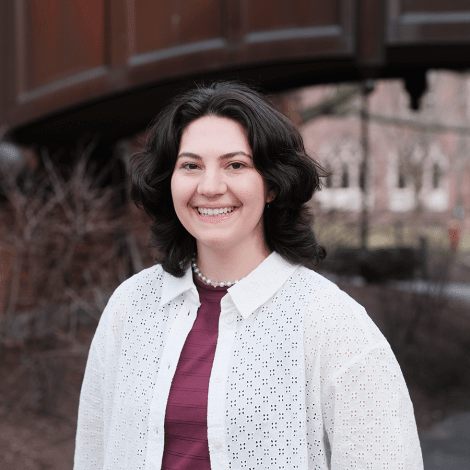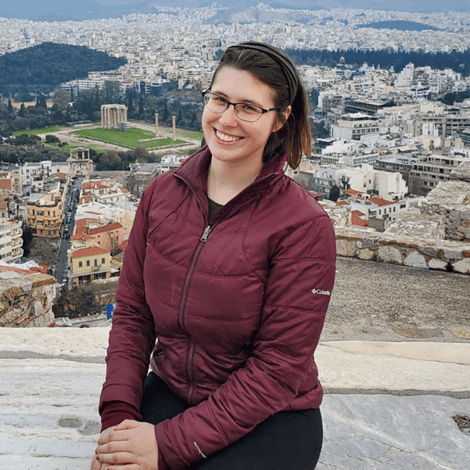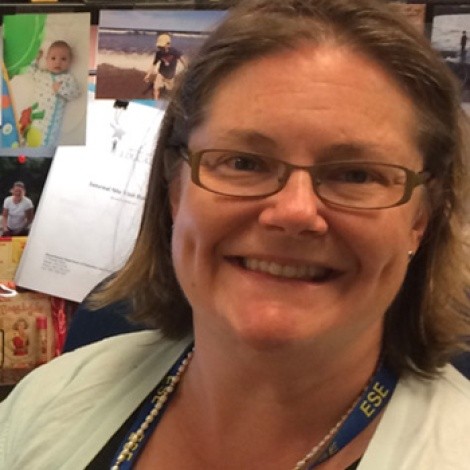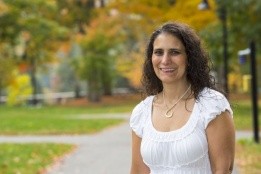RELIG-100 Introduction to Religion
This course is an introduction to the study of religion, assessing the nature of religion and methodological approaches through an examination of subject matter drawn from numerous traditions.
RELIG-102 Introduction to Islam
This course examines Islamic religious beliefs and practices from the origins of Islam to the present, focusing on such central issues as scripture and tradition, law and theology, sectarianism and mysticism. Attention will be given to the variety of Islamic understandings of monotheism, prophethood, dogma, ritual, and society.
RELIG-108 Arts of Asia
This multicultural course introduces students to the visual arts of Asia from the earliest times to the present. In a writing- and speaking-intensive environment, students will develop skills in visual analysis and art historical interpretation. Illustrated class lectures, group discussions, museum visits, and a variety of writing exercises will allow students to explore architecture, sculpture, painting, and other artifacts in relation to the history and culture of such diverse countries as India, China, Cambodia, Korea, and Japan.
RELIG-112 Introduction to Judaism
Judaism is a 3,500-year-old tradition that has developed over time as Jewish communities all over the world creatively interacted with the different cultural and historical milieus in which they lived. This course explores the ways in which Judaism has sought to transform ordinary life into sacred life. What are the ways in which Judaism conceives of God, and what is the meaning of life? What roles do study, prayer, ethics, sex, marriage, family, rituals of the life cycle, and community play in Judaism? These and other questions will be taken up through study of diverse types of religious literature and historical evidence.
RELIG-163 Introduction to Buddhism
Some scholars have argued that there is no such thing as 'Buddhism' in the singular, but only 'Buddhisms' in the plural. This course introduces students to select historically and culturally diverse forms of Buddhism, including Sri Lankan Theravada Buddhism, Japanese Zen Buddhism, and Tibetan Buddhism. The course pays particular attention to modern (and modernist) reinterpretations of Buddhism, including contested views of gender.
RELIG-181 Introduction to African Diaspora Religions
Over the last century, religionists have labored to discover the meaning of African dispersal beyond the continent and its accompanying spiritual lineages. What theories of encounter sufficiently adjudicate the synthetic religious cultures of African-descended persons in North America, South America, and the Caribbean? What are the cross-disciplinary methodologies that scholars utilize to understand African religious cultures in the Western hemisphere? Firstly, this course will introduce the field of Africana religious studies. This background will inform the second and primary objective of the course: thematizing and exploring West and Central African religious traditions housed in the Americas.
RELIG-203 Introduction to the Hebrew Bible
This course examines the many different kinds of texts within the Hebrew Bible (Old Testament) including stories, legal codes, prophecies, proverbs, and poetry. We'll situate these texts in the context of the historical periods in which they were written and uncover the religious and political worldviews they articulate. Students trace the processes through which this diverse collection of ancient literature was gradually gathered together into something called a "Bible" and will reflect on how and why these texts have come to be interpreted in so many different ways over the course of the last two millennia.
RELIG-207 Women and Gender in Islam
This course will examine a range of ways in which Islam has constructed women -- and women have constructed Islam. We will study concepts of gender as they are reflected in classical Islamic texts, as well as different aspects of the social, economic, political, and ritual lives of women in various Islamic societies.
RELIG-208 Religion and Science Fiction
This course examines the representation of religion and religious communities in science fiction. We will read works that speculate on the nature, origin, and function of religious beliefs and practices, and on the place of religion in imagined futures and universes. We will also explore science fiction-based religious movements, the use of science fiction to communicate religious ideas, and Afro-futurism. We will focus on mostly American novels, short stories, film, television, and music. Readings will include works by Ursula. K. Le Guin, Octavia Butler, and Joanna Russ.
RELIG-209 Disability and Religion
What do religions say about disability? How do people with disabilities engage with religious texts, images, practices, and communities? Drawing on different religions and cultures, the course explores the challenges and resources disability offers to religious communities. We study religious narratives that link disability to sin or karma and alternative narratives that reimagine the divine as disabled; access to worship spaces and rituals; ways healthcare professionals can support the religious needs of disabled clients; and the Disability Justice movement, which foregrounds the interlocking oppressions of disability, race, ethnicity, class, gender, and sexuality.
RELIG-225 Topics in Religion
RELIG-225DM Topics in Religion: 'Dante's Inferno Between Myth and History'
Dante Alighieri's Divine Comedy is one of world literature's foundational works. In his 700-hundred years old masterpiece, Dante poses and confronts universal questions that are still at the core of our daily existence: God, love, ethics, gender relationships, politics, social harmony, literature, the afterlife, and the relations between human and nonhuman forms of life. In this course, we will read, analyze, discuss, and enjoy Dante's great poem by focusing on the first of its three parts, the Inferno. In particular, we will be covering Dante's take on mythology and history.
RELIG-225EB Topics in Religion: 'Eco-Buddhism'
This course explores the relationship between Buddhism and the environment, considering how Buddhist beliefs and practices can help us better understand and respond to the climate crisis. We will ask such questions as: Is there room for science and religion in eco-activism? What are the risks of including religious ethics in secular activist movements? Is there such a thing as "Buddhist ethics"? What can meditation and mindfulness actually accomplish? Bringing a range of sources and voices from various Buddhist traditions into conversation with climate scientists and activists, this course considers how Buddhist thought and practice can inform our work towards climate justice.
RELIG-225EC Topics in Religion: 'Ecology, Crisis, and Renewal in Ancient Near Eastern Mythology'
Environmental crises like global warming, deforestation, and pollution are pushing ecosystems to the brink of collapse and endangering populations around the globe. Our present, though challenging to an unprecedented degree, is not the first time humans have faced crises related to climate, depletion of natural resources, and mass migration. In this course, we'll delve into the culture and mythologies of ancient Mesopotamian, Egyptian, and Levantine societies to see how they understood their relationships with their indigenous ecosystems, how they interpreted natural disasters and anthropogenic environmental destruction, and how they imagined starting over again after the end of the world.
RELIG-225FF Topics in Religion: 'Buddhism in Fiction and Film'
What can stories about Buddhists teach us about Buddhism, and what can they teach us about ourselves and the human condition? This course explores Buddhist thought and practice through the lens of fiction, as it is portrayed and represented in literature and film. Each week we will focus on a single Buddhist theme through two different media (one film and one novel), considering it through a variety of perspectives, voices, and cultural contexts. With a central aim of highlighting Buddhism's internal diversity, we will enter into the worlds of Buddhist characters through the stories they tell about themselves. We will also analyze-and interrogate-Hollywood's representation of Buddhists.
RELIG-225KG Topics in Religion: 'Knowing God'
This course examines the following key texts from the ancient world that treat significantly the problem of knowing God and the mystery enveloping such knowledge: Sophocles' Oedipus the King, Plato's Phaedo, Cicero's Concerning the Nature of the Gods, Job, Paul's Epistle to the Romans, and others. Attention is also given to the different ways of thinking about the divine and human natures in these works, which are broadly reflective of Graeco-Roman and Judaeo-Christian value systems.
RELIG-225KH Topics in Religion: 'Kingdoms Human and Divine'
How political authority is wielded is a theme of some of the greatest works in the Greco-Roman philosophical tradition: Plato's Republic, Aristotle's Politics, and Augustine's City of God. Authority exercised well gives rise to good order and human flourishing, but abusive authority results in the opposite: injustice, conflict, and ultimately destructive violence. In this course we will compare how these philosophers addressed the problem of political authority in the human realm with the theme of the kingdom of God in the Bible, especially as found in The Gospel of Matthew and The Book of Revelation.
RELIG-225NR Topics in Religion: 'Reimagining American Religious History: Race, Gender, and Alterity'
This course invites its participants to place critical race and gender studies perspectives in dialogue with the emergence of new religious movements in the United States. Course participants rely on the presupposition that only through a thorough examination of religious traditions on the 'margin' can we fully understand the textured meaning of American religious history as a sub-discipline. Privileging the founding stories and institutionalization of minoritized American religious groups, the course considers how subaltern voices have shaped and transformed American religious life.
RELIG-225RN Topics in Religion: 'Religion and Inequality'
What is religion and how does religion intersect with inequality? This course explores sociology's foundational understandings of religion -- including why people are religious, how religion is expressed in social terms and forms, and how sociologists have studied religion -- before interrogating the impact of Western secularization, and how religion and religiosity intersects with modern dimensions of social and material inequality. Readings will include selections from across the global religious landscape, with particular attention to the dominant world religions.
RELIG-225SP Topics in Religion: 'Medieval Iberia: Art, Society, and Culture'
During the Middle Ages, the Iberian Peninsula was unique in its diversity: social and political, ethnic and religious, linguistic and cultural. This lecture course examines the art and architecture of Spain and Portugal from Late Antiquity to the Middle Ages from the perspective of the interconnections between its various communities. We will explore instances of coexistence and acculturation, periods of persecution and violence, and where these relations found visual expression. Course topics will proceed both chronologically and thematically, taking in subjects such as: religious architectures; court culture; identity, assimilation, and exclusion; and Iberia's connection with the wider European and Mediterranean worlds.
RELIG-226 Philosophy of Religion
This course addresses basic questions in the philosophy of religion. We will focus, in particular, on theistic religions (like Judaism, Christianity, and Islam) that posit the existence of an omnipotent and omnibenevolent creator of the universe. Does God, in this sense, exist? What is the best argument for the existence of such a God? The best argument against? And what if such arguments are inconclusive? Does it make sense to believe anyway? The course will examine classic and contemporary texts from the Western philosophical tradition that address arguments about the existence of God and the rationality of religious belief.
RELIG-234 Women and Gender in Judaism
This course examines gender as a key category in Jewish religious thought and practice. Students examine different theories of gender and intersectional feminisms, concepts of gender in a range of Jewish sources, and feminist Jewish responses to those sources. Students work with the Judaica collection at the Mount Holyoke College Art Museum and consider material culture as a source for women's and gender studies. Topics may include: how Jewish practice and law regulate sexuality and desire; feminist, queer and trans methods of engaging patriarchal texts; methods of studying women and gender in Jewish cultures; racialization.
RELIG-241 Women and Gender in Buddhism
Can women become Buddhas? Why is the Buddha called a "mother"? Who gets to ordain? Why would anyone choose celibacy? Who engages in religious sexual practices and why? This course examines the centrality of gender to Buddhist texts, practices, and institutions. We pay particular attention to the challenges and opportunities Buddhist traditions have offered women in different historical and cultural contexts. Throughout the course we consider various strategies of empowerment, including feminist, postcolonial, queer, trans*, and womanist.
RELIG-246 Womanist Religious Thought
As a conceptual framework which reconsiders the rituals, scriptures, and allegiances of religious Black women, womanist thought has expanded the interdisciplinary canon of Black and feminist religious studies. This course is a survey of womanist religious scholars from multiple religious traditions: Christianity, Islam, Buddhism, and Yoruba-Ifa -- as well as theorists who understand womanism as a "spiritual but not religious" orientation. Course participants will use the interpretive touchstones of cross-culturalism, erotics, earthcare, and health -- among others -- to examine contemporary womanist religious thought.
RELIG-248 Islam in America: From Slavery to the "Muslim Ban
Is Islam an American religion? Muslims in the United States have often been treated with suspicion and their religion viewed as foreign and incompatible with American values. Yet, Islam was present in North America since at least the 1700s in the lives of enslaved Africans. And it was theoretically included in the religions whose free exercise is protected by the First Amendment. This course traces the fraught and complex history of Islam and Muslims in North America, from the loss and preservation of Islamic practices under the regime of slavery through the reclamation of Islamic symbols and identities in African-American movements of the 20th century (e.g., The Moorish Science Temple, The Nation of Islam, and The Five-Percenters) to the rapid growth of a diverse immigrant Muslim community post-1965. Particular attention will be paid to: the intertwining of race, gender, and religion in the self-construction of Muslim identities and the policing of Muslim persons; the depictions of Islam and Muslims in U.S. society and politics; and the use of Islamic themes and symbols in contemporary popular culture, such as hip-hop.
RELIG-254 Eat This Book: A Cross-Cultural Introduction to Sacred Text
Scripture is not only read or interpreted; it is also sung, illuminated, held aloft, buried, recited, eaten, and worn. In this thematic course, students examine what makes a text "scripture" by examining the idea of sacred text across multiple traditions. Students will become familiar with hermeneutic theory and will analyze embodied, material, and performative aspects of religious life as they pertain to the broad category of scripture.
RELIG-257 OMG: God and Her Critics, from the Bible to Ecological Crisis
For a being often said to be immutable, God has been imagined in myriad, often contradictory, ways over the centuries -- even within a single religious tradition. Using Jewish studies as a springboard, this course examines the idea of God through the writings of philosophers and poets, mystics and rationalists from ancient to contemporary times. Topics include: body/spirit dualism and feminist and ecological critique thereof; cross-cultural encounter, diaspora and cultural mixing as generative forces; superstition and other kinds of heterodoxy; and ritual performance.
RELIG-267 Buddhist Ethics
This course examines historically and culturally diverse examples of Buddhist ethical thought and practice. We will ask: How do Buddhists in different times and places define morality? What motivates individuals and communities to care for one another? How hard is it to be "good"? Why bother? What kinds of persons embody Buddhism's highest ethical ideals? Throughout the course we will contrast classical and contemporary Buddhist ethical ideals, highlighting the ways in which Buddhists critically and creatively engage with their tradition in order to address contemporary challenges such as violence, climate change, and social injustice.
RELIG-269 Citizens and Subjects: Jews in the Modern World
This course examines key themes in Jewish intellectual, religious, and political life from the late 17th century to the present. We examine: the effect of civil emancipation and the Enlightenment on Jewish philosophy and theology; Jews as both architects of modern thought and the paradigmatic Other in European liberal nation-states; the transformation of traditional Jewish religious rituals and belief systems in response to dramatic social and political life; new patterns of gender and family organization; the effect of antisemitism, Zionism, and imperialism on Jewish politics; and contemporary Jewish intellectual innovation, including feminist and queer thought.
RELIG-295 Independent Study
RELIG-311 Love, Madness, Discipline: The Sufi Path in Islam
Die before dying." "Set fire to heaven, and douse the fires of hell." "Be consumed by Love, until only the Beloved exists and you don't." "The perceptible world is like a mirage, veiling and disclosing the presence of the imperceptible Real." These are some of the aphorisms of Sufi Muslims who have sought a deeper relationship with the Divine or ultimate Reality. This course explores the contemplative, ascetic, and ecstatic practices through which Sufis pursued this goal and the philosophical, visionary, and poetical writings through which they expressed their devotion and speculation. Attention will be paid to the impact of Sufism on the religious practices, literary and artistic traditions, and social and political institutions of Islamic societies and cultures, from the pre-modern to the contemporary period.
RELIG-331 Advanced Topics in Religion
RELIG-331AF Advanced Topics in Religion: 'African American Spiritualities of Dissent'
This course seeks to understand how protest fuels the creation and sustenance of black religious movements and novel spiritual systems in the twentieth and twenty-first centuries. We will examine the dissentive qualities of selected African American activists, community workers, scholars, spiritual/religious leaders and creative writers. By the end of this course, students will be able to thoughtfully respond to the questions, "What is spirituality?"; "What is dissent?"; and "Has blackness required resistive spiritual communities?
RELIG-331CA Advanced Topics in Religion: 'Carbon Christianity'
This seminar investigates the multiple connections between modern forms of Christianity and fossil fuels. The course begins with a consideration of recent scholarship that details how workers' everyday experiences in coal mines and oil fields profoundly shaped their religious sensibilities. We then examine how fossil fuel companies funded many of the most significant Christian institutions in the United States-both liberal and conservative -- during the twentieth century. Finally, the course will reflect on contemporary Christian responses to climate change, both those that seek to halt the burning of fossil fuels and those that deny it is taking place.
RELIG-331HB Advanced Topics in Religion: 'The Human Body in Jewish Thought'
How have ancient and modern Jewish thinkers imagined the body, its purposes, and the diversity of embodied forms and experiences? In this course, students explore these themes through a range of textual case studies related to creation, ability and disability, appearance, gender and sexuality, aging, death, birth, and love. Through texts drawn from the full range of Jewish religious literature, we will also get to know some of the major Jewish textual corpora and the cultural contexts in which they developed. Throughout the course, we explore critiques of, engagements with, and renewals of these discourses from the perspective of contemporary feminist, Queer, and Disabled scholars.
RELIG-331LA Advanced Topics in Religion: 'Race and Religion in Latin America'
The course will begin with an investigation of the proto-racial and religious categories through which Europeans in the early modern era understood human difference. From there, we will trace how these notions were re-conceptualized in the centuries following the encounter between Europeans, Africans, and the Indigenous Peoples of the Americas. As we examine this history -- including the emergence of slavery, eugenics, mestizaje, and Liberation Theology -- we will pay particular attention to how interwoven racial and religious hierarchies were both constructed and resisted. The final section of the course will concentrate on the contemporary entanglements of race and religion in the region.
RELIG-331RC Advanced Topics in Religion: 'Ethnographic Research in Religious Communities'
With a focus on local religious communities, this course puts into practice the research methods, modes of analysis, and writing styles that characterize ethnographic fieldwork. We first consider prominent ethnographies of religious communities in the United States in order to better understand the specific questions, debates, and ethical challenges that this literature addresses. Students then gain hands-on experience with a variety of ethnographic methods through course field trips to local places of worship. Final projects are rooted in extensive independent ethnographic research with a religious community.
RELIG-331SE Advanced Topics in Religion 'Anthropology of Secularism'
What is secularism? For many of us, the answer is obvious: the world without religious belief, or the separation of church and state, or even the "really real" world. In recent years, scholars in number fields have begun to question these common sense notions about secularism. In this course, we will investigate this rapidly expanding literature and the critical lines of inquiry it has opened up: Under what specific cultural and historic conditions did secularism first emerge? Is secularism experienced today in the same way throughout the world? If not, how do they vary? What ways of being and living does secularism encourage or allow to flourish? Which does it stunt, block, or prohibit?
RELIG-331SL Advanced Topics in Religion: 'Spain and Islam'
This course will explore questions and concerns regarding the "Islamic constant" of Spanish history. We will focus on four major political and cultural contexts: the coexistance and conflicts among Jews, Muslims, and Christians in Medieval Iberia; the "moriscos" (converted Muslims) of Imperial Spain (sixteenth-seventeenth centuries); Spanish orientalism and colonial enterprises in Africa between the end of the nineteenth and the first half of the twentieth centuries; and the question of the Muslim emigrants in contemporary Spain. Readings will include literary texts, political and legal documents, historical accounts, and other cultural material such as arquitecture, film, and documentaries.
RELIG-343 Against Productivity: Sabbath as Countercultural Practice
The practice of a weekly day of rest dates back millennia. Today, the Sabbath beckons as an antidote to the relentless demand to be productive. This seminar explores the ideas, actions, and communal dimensions of the sacred day that anchors the seven-day calendar, focusing on Jewish texts and practices. Key themes include sacred time, cultural identity, and the transformation of religious life over time. Students explore the development of the Sabbath using narrative, folk, and legal primary sources and in experiential learning. Students will pursue an extended research project.
RELIG-352 Body and Gender in Religious Traditions
Do bodies matter in religious traditions? Whose bodies matter? How do they matter? By studying religious body ideals and practices, we examine the possibilities and problems different kinds of bodies have posed in religious traditions. Topics include religious diet, exercise, and dress; monasticism, celibacy, and sexuality; healing rituals, and slavery and violence. We pay special attention to contemporary challenges to problematic body ideals and practices coming from feminist, disability, postcolonial, queer, and trans theorists and activists.
RELIG-361 The Aquatic Life of Black Devotion
Water informs religious and spiritual worldviews the world over; commonplace rituals from baptism to libation underwrite its prescience. The religious cultures of West and Central Africa, along with its multiple diasporas, theorize, encounter, and engage water centrally. Seminar participants will dive deeply into the water-based epistemologies of African and African diaspora religions, probing liturgical language, ritual performance and spiritual entities for aquatic common threads. Seminar participants will analyze the historical realities that have made water such a contested yet indispensable feature of black religious life.
RELIG-395 Independent Study



